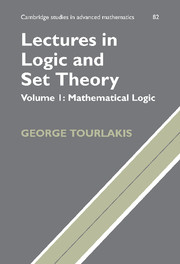I - Basic Logic
Published online by Cambridge University Press: 16 January 2010
Summary
Logic is the science of reasoning. Mathematical logic applies to mathematical reasoning – the art and science of writing down deductions. This volume is about the form, meaning, use, and limitations of logical deductions, also called proofs. While the user of mathematical logic will practise the various proof techniques with a view of applying them in everyday mathematical practice, the student of the subject will also want to know about the power and limitations of the deductive apparatus.We will find that there are some inherent limitations in the quest to discover truth by purely formal – that is, syntactic – techniques. In the process we will also discover a close affinity between formal proofs and computations that persists all the way up to and including issues of limitations: Not only is there a remarkable similarity between the types of respective limitations (computations vs. uncomputable functions, and proofs vs. unprovable, but “true”, sentences), but, in a way, you cannot have one type of limitation without having the other.
The modern use of the term mathematical logic encompasses (at least) the areas of proof theory (it studies the structure, properties, and limitations of proofs), model theory (it studies the interplay between syntax and meaning – or semantics – by looking at the algebraic structures where formal languages are interpreted), recursion theory (or computability, which studies the properties and limitations of algorithmic processes), and set theory.
- Type
- Chapter
- Information
- Lectures in Logic and Set Theory , pp. 1 - 204Publisher: Cambridge University PressPrint publication year: 2003

